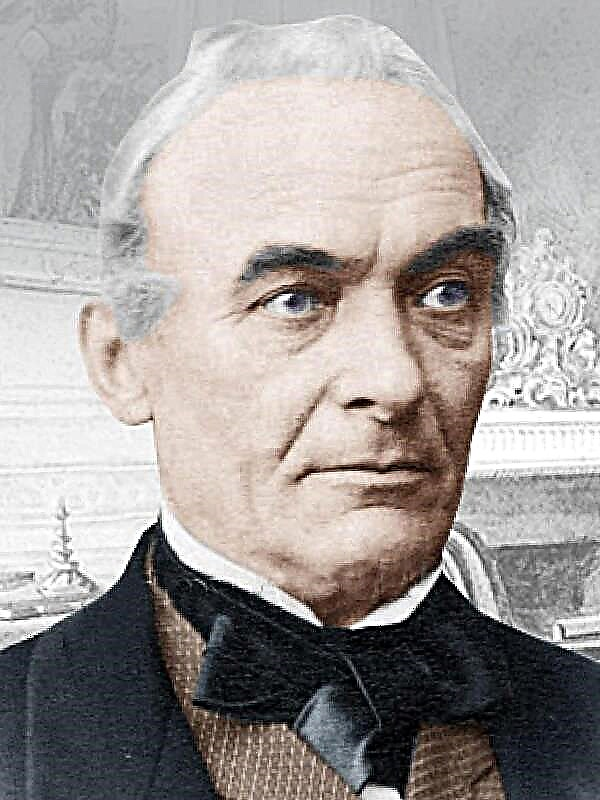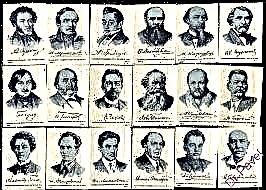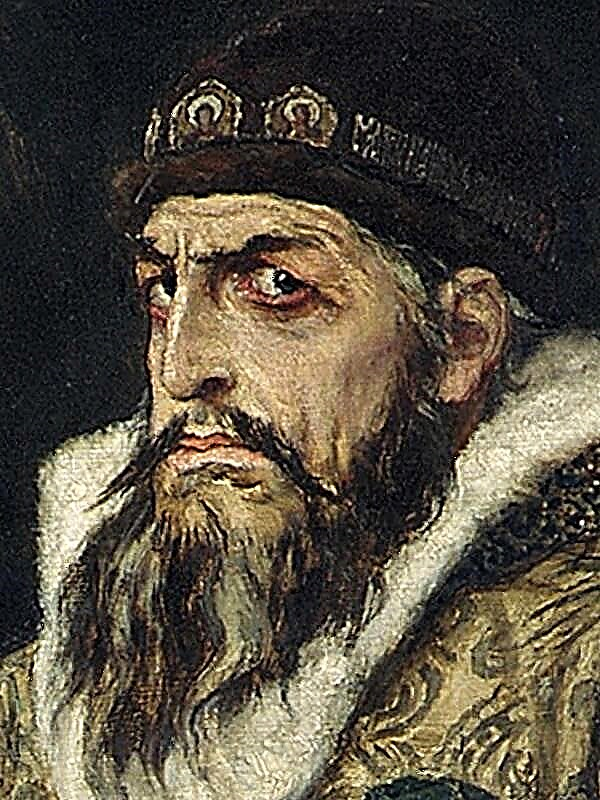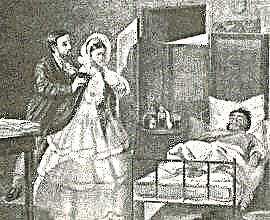Colon is a place north of Athens. There was a sacred grove of goddesses Eumenes, the terrible guardians of the truth - those that Aeschylus wrote about in Oresteia. Among this grove stood an altar in honor of the hero of Oedipus: it was believed that this Theban hero was buried here and guarded this land. As the Theban hero’s ashes turned out to be in Athenian land, this was described in different ways. According to one of these stories, Sophocles wrote the tragedy. He himself was from Colon, and this tragedy was the last in his life.
From an incestuous marriage with his mother, Oedipus had two sons and two daughters: Eteocles and Polinic, Antigone and Ismen. When Oedipus blinded himself for his sins and stepped down from power, both sons recoiled from him. Then he left Thebes and went wandering somewhere unknown. Along with him, the faithful daughter of Antigonus left - a guide with the decrepit blind man. Blinded, he regained his soul: he realized that through voluntary self-punishment he atoned for his involuntary guilt, that the gods forgave him and that he would die not a sinner, but a saint. This means that sacrifices and libations will be made on his grave, and his ashes will be the protection of the land where he will be buried.
The blind Oedipus and the tired Antigone go on stage and sit down to rest. "Where are we?" Oedipus asks. “This is a grove of laurels and olives, grapes are twisted here and nightingales sing, and in the distance - Athens,” says Antigone. A watchman comes out to meet them:
"Get out of here, this place is forbidden to mortals, Eumenids, daughters of Night and Earth, live here." “Oh happiness! Here, under the shadow of Eumenes, the gods promised me a blessed death. Go, tell the king of Athens: let him come here, let him give me little, but he will receive much, ”Oedipus asks. “From you, a blind beggar?” - the watchman is surprised. "I am blind, but my mind is sighted." The watchman leaves, and Oedipus offers prayers to the Eumenes and all the gods: "Keep the promise, send me the long-awaited death."
A chorus of colonial residents appears: they, too, are at first angry when they see a stranger in the holy land, but his miserable appearance begins to inspire sympathy for them. "Who are you?" “Oedipus,” he says. "Father-killer, incest, away!" - “My sin is terrible, but involuntary; do not persecute me - the gods are fair and you will not be punished for my guilt. Let me wait for your king. ”
But instead of the king, another tired woman appears from the far side - Ismen, the second daughter of Oedipus. She has bad news. In Thebes feuds, Ateocles expelled Polynik, he gathers the Seven against Thebes; the gods predicted: "If Oedipus is not buried in a foreign land, Thebes will stand." And then an embassy has already been sent for Oedipus. "Not! Oedipus shouts. “They disowned me, they drove me out, let them now destroy each other!” And I want to die here, in the Athenian land, for her good, her enemies for fear. ” The chorus is touched. "Then make a purification, make a libation with water and honey, propitiate Eumenes - only they can forgive or not forgive the murder of a relative." Ismena prepares the rite; Oedipus, in roll call with the choir, mournes his sin.
But here is the king of Athens: this is Theseus, a famous hero and a wise ruler. “What are you asking, old man?” I am ready to help you - we are all equal under the gaze of the gods, today you are in trouble, and tomorrow I am. " - "Bury me here, do not let the Thebans take me away, and my dust will be your country of protection." “Here is my word to you.” Theseus leaves to order, and the choir sings praise to Athens, Colon and the gods, their patrons:
Athena the mistress, Poseidon the horse, Demeter the farmer, Dionysus the winegrower.
“Do not be fooled! - prays Antigone. “Theban ambassador with the soldiers is already coming.” This is Creon, the Oedipalus proper, the second man in Thebes under Oedipus, and now under Etheocles. "Forgive our guilt and have pity on our country: it is your own, and this one, although good, is not yours." But Oedipus is firm: "Not by friendship you came, but by need, but I don’t need to go with you." “There will be a need! - threatens Creon. “Hey, grab his daughters: they are our Theban subjects!” And you, old man, decide: will you come with me or stay here, without help, without a guide! ” The choir grumbles, the girls cry, Oedipus curses Creont: “As you leave me alone, you’ll be left alone in your declining years!” This curse will come true in the tragedy of Antigone.
Theseus hurries to help. “An insult to my guest is an insult to me too!” Do not disgrace your city - let the girls go and go away. ” “Who are you standing up for?” - argues Creon. “For the sinner, for the criminal?” “My sin is involuntary,” Oedipus replies with tears, “and you, Creon, sin by your own will by attacking the weak and the weak!” Theseus is firm, the girls are saved, the choir praises the Athenian valor.
But the trials of Oedipus are not over. As Thebes Creon asked for help, so now the exiled son Polinic came to him to ask for help. He was impudent, this one is touching. He cries about his misfortune and Oedipus misfortune - let the unfortunate understand the unfortunate! He asks for forgiveness, promises Oedipus, if not the throne, then the palace, but Oedipus does not listen to him. “You and my brother killed me, and your sisters saved me! May they be honored, and you will die: do not take Thebes to you, kill your brother’s brother, and let the curse of Eumenides-Erinius be upon you. ” Antigone loves her brother, she begs him to dissolve the army, not to destroy his homeland. “Neither I nor my brother will give in,” Polinik replies. “I see death and I am going to die, but you, sisters, may the gods preserve.” The choir sings: “Life is short; death is inevitable; there are more sorrows in life than joys. The best part is not to be born at all; second share - rather die. Labor oppresses, unrest ruins; and old age in the midst of torment - like an island in the midst of the waves. "
The end is drawing near. Thunder booms, lightning shines, the choir calls to Zeus, Oedipus calls to Theseus. “My last hour has come: now I will enter the sacred grove with you alone, find the coveted place, and my ashes will rest there. Neither my daughters nor your citizens will know him; only you and your heirs will keep this secret, and while it is kept, will the Oedipus coffin protect Athens from Thebes. Behind me! and Hermes leads me, bringing souls to hell. ” The choir, kneeling, prays to the underground gods: "Let Oedipus peacefully descend into your kingdom: he deserves it with torment."
And the gods heard: the messenger reports on the wonderful end of Oedipus, He walked like a sighted one, he reached the lesson, washed himself, dressed in white, said goodbye to Antigone and Ismen, and then an unknown voice came:
“Go, Oedipus, do not hesitate!” The hair stirred at the companions, they turned and walked away. When they turned, Oedipus and Theseus stood nearby; when they looked round, There Theseus stood there, blocking his eyes, as if from intolerable light. Whether lightning has lifted Oedipus, whether the whirlwind has rushed off, whether the earth has accepted into its fold - no one knows. Sisters come back after the messenger, mourning their father, Theseus - after the sisters; the sisters go to Thebes' relatives, and Theseus chorus repeats Oedipus’s covenant and his blessing: “May it be indestructible!”












